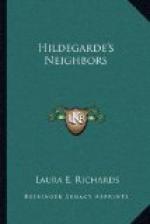CHAPTER XVI.
Good-by.
The golden morning passed all too quickly; the mornings always did, out at camp. There was the merry dish-washing, the sweeping and setting to rights, and then all separated to their different tasks,—fishing, boat-mending, cooking, photographing or surveying, till the hour of noon brought them together again for the swimming. Roger departed on his wheel, having business in the village.
The three girls sat down before a huge basket of mending, “Three against Thebes,” as Bell said, and plied their needles diligently. Hildegarde felt as if she were sewing in a dream; her fingers flew, for she could almost sew in her sleep, but her thoughts were away in the Lonely Cove, with the wild creatures and the stillness. She would like to go back there, she thought, with— well, she would like to go back there, and stay, long hours, till the spirit of the place had sunk deep into her heart. She had felt it, the touch of its hand in passing, the brushing of its robe, but that only showed her how little she knew, how infinitely more there was to learn, to see, to love. She shut her eyes and tried to call back the scene, all grey and silver, glimmering in the faint early light.
Was not this really life, the life of nature, of the woods and fields? Would not one grow better, purer, to stay always in this lovely wilderness, where every leaf had a voice, every stone showed forth its steadfast lesson, every morning and evening was full of joy and peace? Why should one ever go back to places where people talked and gossiped and made formal calls?
Such new worlds, too, were opening before her! Not only this great one of nature, but the sister world of science, which till now had been only a name. She had always thought of “scientific people” much as she would of the inhabitants of Mars, never having been thrown with any in this short life, which seemed to her so long, so full. As she said to her friend here, she had had many lives already, all beautiful, joyful beyond measure; but this strange world, where they spoke a language of their own, where all the men wore spectacles and long beards, and all the women short hair and spectacles,—this world she had never thought even to peep into. And now—behold! the magic door had been opened by friendly hands; opened only a little way, it was true, but wide enough for her to see at least beyond the threshold,—and it was fairy-land! As for the long beards and the spectacles,—Hildegarde laughed to herself, a little soft, happy laugh.
Gerald, who was lying at her feet, looked up, and laughed too, for pure good-will.
“Good joke!” he said; “excellent joke! See here, Miss Hilda—”
“Do leave off that tiresome ‘Miss,’ Jerry! You know I told you to, ages ago.”
“I know! but my manners are so superlative. Well, Hilda, then, just listen to this! I have been improving a little on one of your old ballads—”




